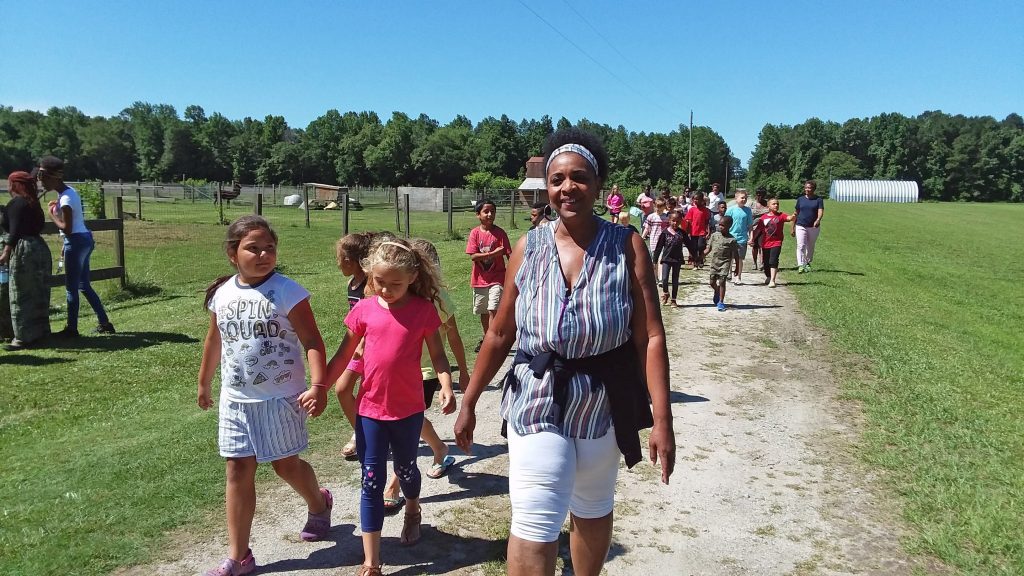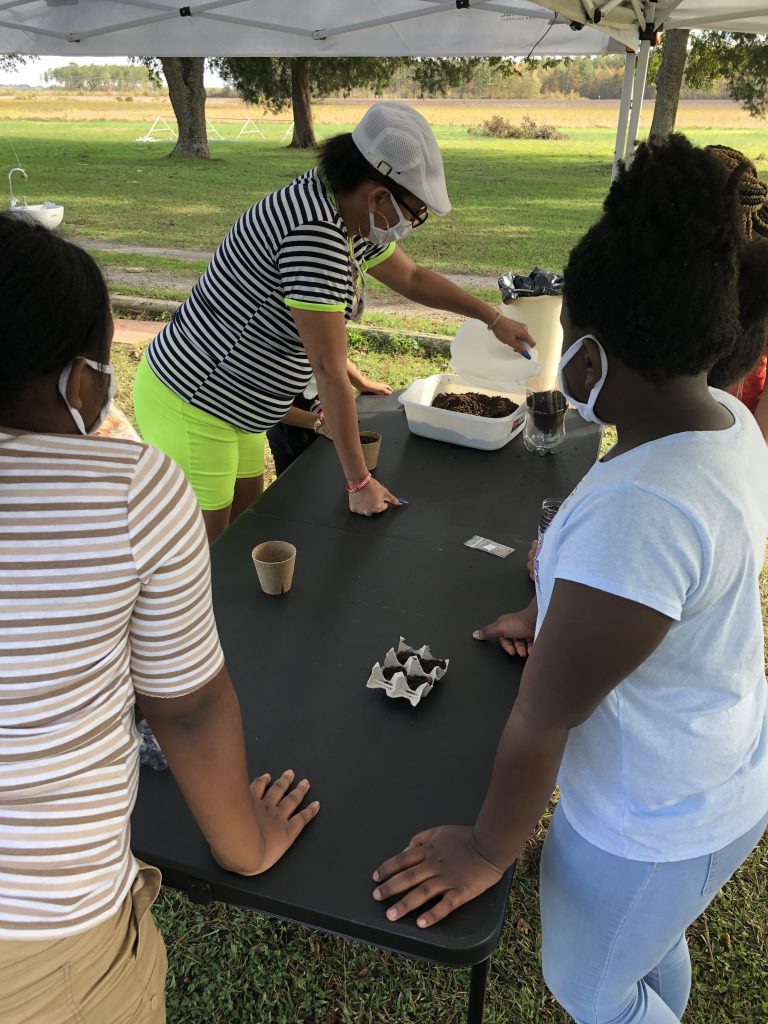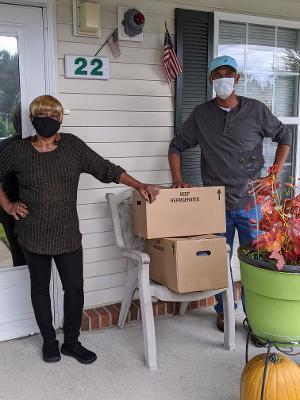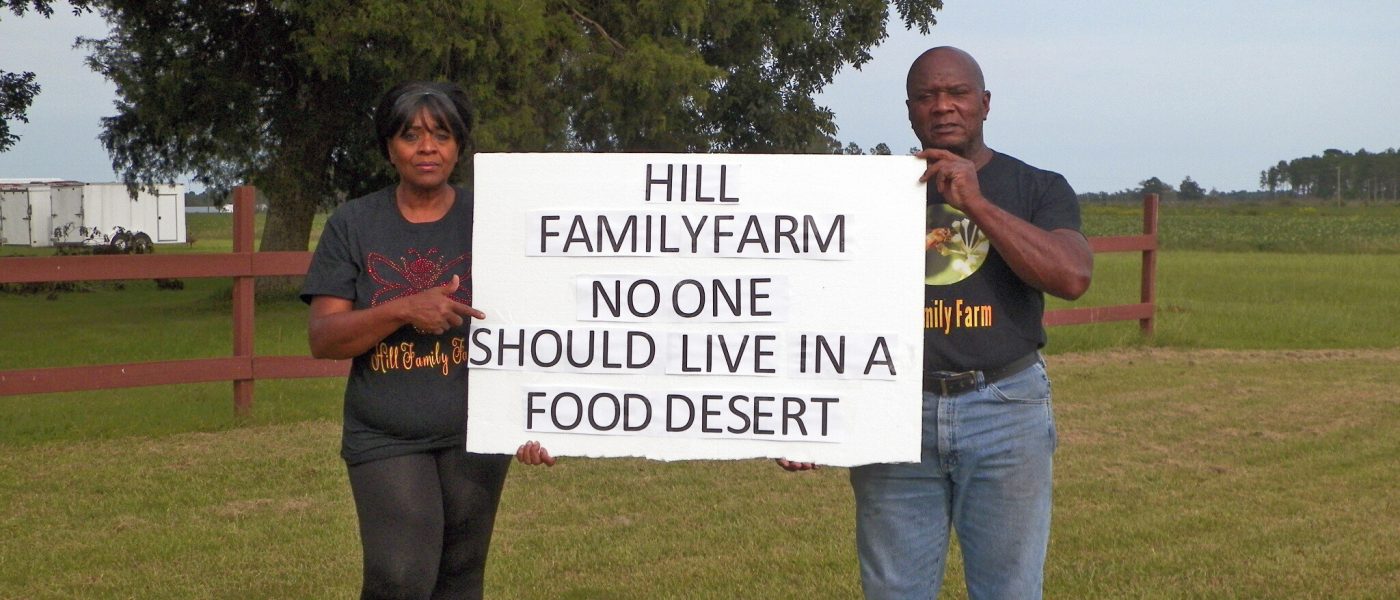Hill Family Farm in Whitakers, North Carolina, was founded in 2008 by Eunice and Silvester Hill, and today it serves as a crucial community resource. Hill Family Farm brings people together, teaches children and adults alike about health, fitness and nutrition, and introduces agriculture to a new generation. Eunice explains, “First and foremost, we are trying to uplift our community.” In these times and in this community, the work of Hill Family Farm is revolutionary.
It starts with a love story…
Eunice grew up in Puerto Rico, moving to New York City in 1981 after pursuing her college degree. After graduation, she married and started a family, raising her son in Virginia, mostly as a single parent. In 2000, her son, who was nine at the time, offered to help his mom set up an online dating profile, persuading her that she deserved love and happiness.
“Well, one day, I hear ‘You’ve got mail!,’” she says, impersonating the famous greeting. “And I have this message that says, ‘I may not be what you’re looking for, but I believe I might be what you need,’” laughs Eunice. “I’d been looking for a good, hardworking man, and that is what Silvester is. Six months later we were married!”
Silvester also grew up in a farming family, in rural Virginia. He started farming in high school, but he instead found his career as a tool maker engineer. He hoped to get back to farming someday; in Eunice, he found an able and willing farm partner. She had always kept a garden and chickens, even in urban Virginia. When the two began joining households, they looked for a place with land for farming and also enough room for landing planes to accommodate Silvester’s other interest in building and flying ultralight aircraft called powered parachutes. Silvester was one of the first powered parachute instructors and pilots in the USA. He explains, “I was in the right place to become an instructor in early 1984. After years of training in and selling the original design, the Para-plane, I started building my own design. In 1991, I built my first Slyflite Angel.”
Eunice and Silvester found their home in Whitakers, North Carolina; it had been a former plantation and consisted of 35 acres on which they could build a runway and a farm. As Eunice describes it, “We soon found our new community was made up of people who were really struggling. It was 2008 and it was the height of the financial collapse. We started rescuing farm animals from local farms and families that were struggling to feed them. And we realized the people needed feeding too. We started giving away the vegetables we grew.”
Their full time off-farm jobs helped make Eunice and Silvester’s generosity possible. Eunice had been an Early Childhood Director for more than 30 years and spent 10 years as a Head Start director, directing early childhood programs. She took time off from Early Childhood Development and accepted a position with the United Church of Christ as Food Justice Project Manager, fighting food insecurity by building their community garden program across many cities. She works now with the Partnership for Children and North Carolina State University to develop outdoor learning for 25 schools, overseeing programs that teach young people about the value of our natural resources, exercise and healthy eating. Silvester will retire soon from his work as a tool maker engineer, and he has his own business building his Angel aircraft and teaching others how to fly. Hill Family Farm hosts para-plane enthusiasts and newcomers at their unique “chute out” event each year. Somehow, they also manage to find time for farming!

Eunice leads a group of young people visiting the farm.
Teaching the Next Generation
Their myriad experiences and skills make Eunice and Silvester well-suited for farming, but their focus leans perhaps even more to education. “This is a place where we do so much around agriculture,” says Eunice. “We teach people how to cook from the garden to the table; we have conversations that help us heal ourselves. When folks see people that look like them doing this, it motivates them to eat healthy and grow food.” She explains, “We often hear, ‘You’re not the typical farmers.’ We are so diverse in what we do. But once we put it together, it all goes hand in hand.”

Students in the Youth Life Skills Academy learn about growing plants from seeds at Hill Family Farm.
In 2015, the local school system approached Hill Family Farm to develop an agriculture program for exceptional students, a concept Eunice had previously implemented in her work with the Church of Christ. Through the Youth Life Skills Academy, Halifax Public Schools’ high school students take courses on the farm to learn about agriculture, livestock and healthy eating. The Academy requires students to accrue hours spent working and learning on the farm in order to graduate. Younger children also learn on-farm through field trips and summer camps. The farm utilizes a corps of volunteers, paying small stipends to volunteers who range from youth to seniors, including an 83-year-old veteran.
Today, Hill Family Farm has a menagerie of about 30 animals, from African pygmy goats, alpacas and donkeys to Vietnamese pigs, dogs, turkeys, peacocks, chickens and bees in 20 beehives. “They are not food,” Eunice explains. “They each have a name, and they welcome families and schoolchildren to the farm and introduce them to new experiences. The kids love the animals; they are therapeutic.” The farm’s bees produced 155 pounds of honey this year, much of which went into the farm’s food box program, which helped feed senior citizens across the county during 2020.

Delivering boxes of fresh, healthy food during the COVID-19 pandemic.
Their community has been hit hard by COVID-19. Eunice says, “Many people here are blue collar workers who have lost their jobs because of the pandemic. Even before the pandemic, they had to drive 25 miles to the closest grocery store, and there are a high number of people here with diabetes and hypertension. People are not growing their own food. We can show them how, or at least help them access healthy food.” In addition to delivering boxes of farm-fresh food to people in need, Eunice also partnered with local Black-owned restaurants. “With COVID, they were on the verge of losing their businesses. I said, ‘You help me, and I’ll help you,’ and since June, we have served two hot meals every weekend to feed our neighbors.”
“For many in our community, it’s more affordable to eat food that isn’t fresh or healthy. We are working to stop food injustice and make good food affordable and available to all.”
Food justice is a driving force of Hill Family Farm; for Eunice it means that people can have access to fresh fruits and vegetables. “We are extremely blessed that we can walk to our garden and have our choice of healthy foods,” she says. “For many in our community, it’s more affordable to eat food that isn’t fresh or healthy. We are working to stop food injustice and make good food affordable and available to all.” She pauses and emphasizes her next words, “Twenty-five percent of children in this county are food insecure. That is sad. We need to do better.”
Even during the incredible challenges presented during 2020, Hill Family Farm safely held the events and programs that are so important to the well-being of the community members in and around Whitakers. On November 8, Eunice celebrated her sixtieth birthday at Hill Family Farm’s annual farm conference, which brought together local farmers, a master beekeeper, a US Department of Conservation expert and many people interested in agriculture. With social distancing, hand washing stations, and masks, folks gathered to learn and share their knowledge and celebrate their connection to food, farming and each other. “A lot of the medicines we have to heal ourselves and our communities are in our garden,” Eunice says. “And together, we can feed our minds with positivity.”
I Farm Because…
We met Eunice and Silvester when they responded to a call Farm Aid put out for photos from farmers about why they farm. They sent their “No One Should Live In A Food Desert” photo and it ran as part of a segment we helped produce on Good Morning America about family farmers responding to the COVID pandemic. See it and more in this slideshow video:




